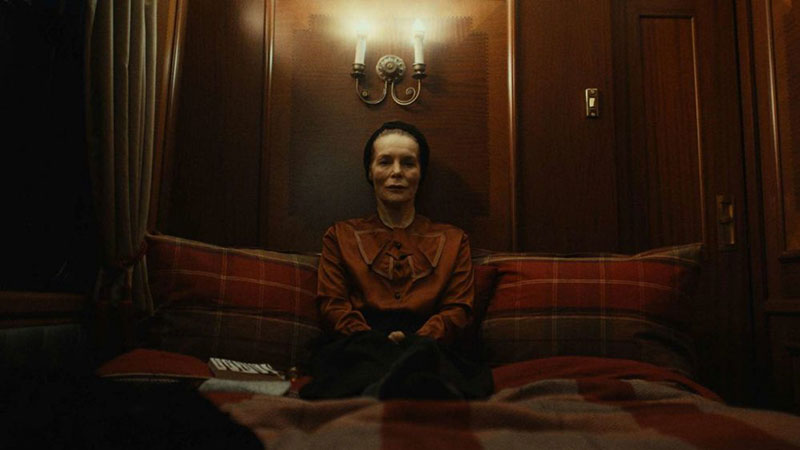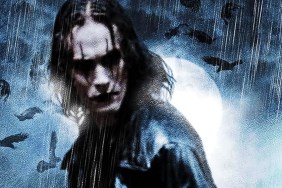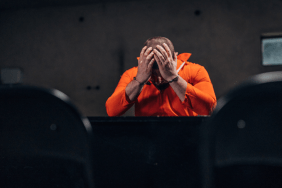Charlotte Colbert’s feature directorial debut She Will is a psychological horror film starring Alice Krige, Malcolm McDowell, and Kota Eberhardt. The dark yet empowering tale examines a physically and psychologically scarred woman who goes on a journey of reclaiming her identity and reshaping reality as she inevitably demands vengeance (with help from those who came before) on the man who traumatized her years ago.
“The film explores the story of aging actress Veronica Ghent (Krige) who, after a double mastectomy, goes to a healing retreat in rural Scotland with her young nurse Desi (Eberhardt),” reads the official synopsis. “She discovers that the process of such surgery opens up questions about her very existence, leading her to start to question and confront past traumas. The two develop an unlikely bond as mysterious forces give Veronica the power to enact revenge within her dreams.”
Following the film’s screening at Fantastic Fest in Austin, Texas, ComingSoon’s Senior Movie & TV Editor Kylie Hemmert spoke with director and co-writer Charlotte Colbert along with stars Alice Krige and Malcolm McDowell about Veronica’s journey, narcissists, intersecting realities, the many scars we wear, and more.
*Warning: This interview contains spoilers for She Will*
Kylie Hemmert: I really enjoyed the film and the journey it takes us on through Veronica’s experiences. I was immediately pulled in by the monologue at the beginning when she’s talking about how every mask has a function and how her mask is about preservation. Charlotte, I was wondering if you could talk about that opening and share why you wanted to start with that particular dialogue.
Charlotte Colbert: Wow, thank you so much. I guess it was, it’s quite internal– So, the story follows Veronica’s character as she has this operation that sort of triggers this bout of questioning and this sort of existential re-questioning of her life. And so it felt interesting that the dichotomy between the operation and her sort of trying to keep it together and keep appearances together and sort of layering this sort of armor that she’s had her whole existence, and that in a way is gonna come crumbling down during the course of the film. So the way she physically starts, you know, with the makeup and the voiceover intercut with the operation and where she ends in a way is kind of, I guess, visually and emotionally, and in terms of her journey, you know, completely different. And I guess it’s, it is like sort of a story of reclaiming and reinterpreting one’s wounds and one’s scars and owning them and making them one strength. And so it felt fitting to perhaps, um, go into her mind basically at the beginning.
For Alice and Malcolm, what were your initial reactions when you read this script? Were you immediately pulled in as well? Or what drew you both to these characters and the project?
Malcolm McDowell: Well, my first thought was, “Who is this lucky lady that’s playing this leading part in this movie?” I thought it was beautifully written about a subject I’ve not really seen or read about before. And I think it’s a very important discussion– And, you know, the part that I played, of course, he thinks that, because he’s a bit of a narcissist, of course, that he’s right, as all narcissists do. But of course, you know, she was groomed, whether it was conscious or not, it’s really not the point, neither here nor there. But he obviously groomed this underage girl to, you know, idolize and fall in love with him because of course, he was in a position of great power being the director. Your director, and when you’re a very young person is, of course, like a God. And you have tremendous influence, uh, over a young actress, of course. And so, that line can easily, I suppose, be crossed, but by someone who is a narcissist and really is only thinking of themselves. And I think the long-term consequences of this relationship that happened years and years ago when she was a mere girl has affected her, where of course it hasn’t affected him in the slightest. He went on and had a great career, is going to be offered a knighthood, but she had to live with that experience. And that’s why you’ve got this intriguing film. So that’s it from my points.
Alice Krige: I met Charlotte, and I fell in love with her immediately.
Colbert: And me with her. [laughs]
McDowell: We all fell in love with her.
Krige: Of course, it’s the most astonishing role to have been given. Um, but your question was about, what was it about the script? I was so struck by the layeredness of the writing, the way that the whole story is looked at in terms of the cosmos, the power of multiple dimensions. And that’s very rarely addressed in serious film. That we don’t function just on our level of perceived reality, but there are layers and layers of intersecting reality, or dimensions, and I’ve never seen it actually explored in a film. And I was astonished that it was even being looked at. Of course, Veronica is [on] an extraordinary journey, and to be given the opportunity to explore that with Charlotte, with Malcolm, with everyone that was there, was an extraordinary gift because for me; it’s always about the possibility of discovering something. A moment of, perhaps, understanding. And if you can find that in the journey of the character within yourself, perhaps someone else watching it will experience that, too. And this script, you know, more than most offers that opportunity to an actor and to the audience.
Obviously, there are many different themes in the movie that will resonate with people, including some very vulnerable subjects dealing with trauma or other anxieties, especially over aging and how people are treated differently due to that. After the early scenes where Veronica initially sort of resents and rejects some of her nurse Desi’s help, even at one point telling her that she isn’t an infant, I loved seeing how the bond between Veronica and Desi shifted throughout the film where not only did they become closer, these two different generations of women, but, you know, by the end, Veronica is thanking her for coming back for her, for helping her. And so, for Charlotte and Alice, how did you go about handling that particular part of the story, the bond between those two characters, and why you felt it was significant to show their experience together?
Krige: The one thing that I didn’t touch on in my first answer was the other aspect of the script that was fascinating was that it looks not only at the wounds of a much older woman, but it hints at the wounds of a young woman who has also obviously suffered emotional abuse. And they’re dealing with it in very, very different ways, and Desi is immensely vulnerable, but she also has an enormous internal toughness, which I think Kota inhabited beautifully, the vulnerability and the sort of core of grit. And it’s really that capacity that that character has through the trauma that she has suffered. Her choice is not to put on armor, but to help other people, she becomes a nurse. That’s a challenge working with older, cross, hurting people, and that’s exactly what Veronica is. But her compassion actually enables Veronica probably for the first time since the episode that happened on that film set, to trust someone. I think it’s the first time she actually trusts someone. And that’s also part of being prepared, to shed the armor, in addition to the whole thing that happens with the spirits of the witches.
Colbert: Yeah, and I guess in some ways, like for me, Desi, who Kota plays, it is really kind of an element of hope, of sort of going beyond like binary thinking and going beyond, sort of, you know, clear-cut notions potentially of gender, etc., and sort of finding a new way, a new voice in a way. A new path to reinterpret, you know, a new way forward, basically.
I think my favorite scene is probably when she [Veronica] completely bares herself and reveals those scars and is seemingly no longer ashamed, because at first, you know, she’s trying to constantly put on the prosthetics too quickly after surgery and Desi warns her about that, but she is obviously feeling ashamed. And I loved that moment where, it kind of normalizes those scars and shows that it’s not something to be ashamed of. So how important was it to get that message across on-screen about those scars?
Colbert: Yeah, really important because I think there’s lots of different scars. There’s the physical scars and the psychological scars, and the historical ones that are carried within the earth by the history of these persecuted women as well. And actually, in the visual renditions of even of the prosthetics, you know, they do sort of hark back to those images of the Amazons, you know, these sort of amazing warrior women who sort of didn’t have breasts. And, um, yes, I’m so glad that you got that from the film because yeah, it’s amazing to be able to reinterpret what hurts us to make us stronger.
For the last question for Alice and Malcolm, could you talk about what it was like filming that revenge scene near the end when Veronica is finally able to basically confront Hathbourne?
McDowell: I haven’t seen it myself. How was it?
Colbert: It’s like you’re both in each other’s reality, it’s in your mind.
Krige: When you hit me on the head.
McDowell: Oh, that was good.
Krige: [laughs]
McDowell: That was so cool. We didn’t really get enough scenes together, in my book. Um, may want to make a note of that for next time. [laughs] In Alice I see something that I see in myself, too, a total enjoyment of the work. Now that is a beautiful thing. You know, she’s had it all her life and I’ve had it all mine, is that we totally love the work. And I’m talking about pretty much everything that we agree to do. We always find some wonderful thing in it. And, I know she did in this part, of course, even though I wasn’t there, but, I kind of started them off a little bit, didn’t I?
Colbert: He did, with a bang.
McDowell: I started you off. Thank God I didn’t have to go to the Highlands in freezing weather. [laughs]
Colbert: Malcolm basically did the beginning– We started the shoot with Malcolm’s scenes.
McDowell: Yeah.
Krige: For me, the one thing that you’ve got when you’re working, that you’ve got for sure — ’cause you never ever know how it’s going to turn out — what you’ve got is the exchange that happens in that white-hot circle of the set, right? Me and Malcolm, between me and Charlotte, between me and Jamie [Ramsay], the cinematographer, it’s like a circle that’s like white-hot. If it’s all happening, you never know if it’s going to, and that’s what you’ve actually got. That’s the whole point for me is that exchange. Because if that exchange works, then you potentially have something that you can offer to people watching the movie. And Malcolm and Charlotte are consummate artists of that white-hot space. So it was just a privilege and a joy to be with them.










